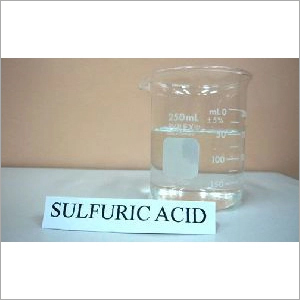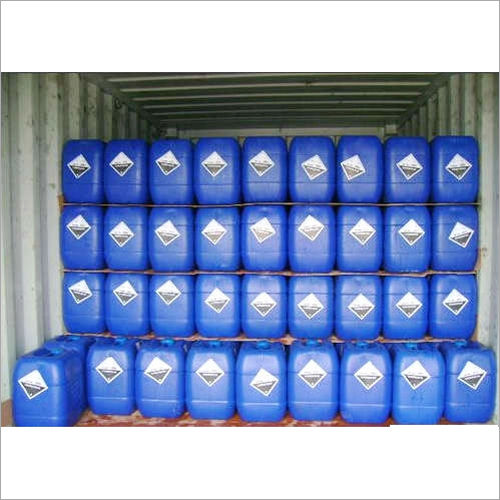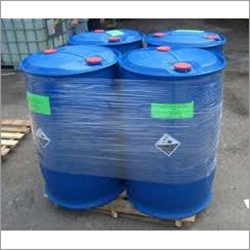
Sulfuric Acid
Product Details:
- Molecular Weight 98.079 Grams (g)
- Molecular Formula H2SO4
- Boiling point 337 C
- Application Industrial
- Appearance Colourless viscous liquid
- CAS No 7664-93-9
- Other Names Hydrogen sulfate
- Click to View more
X
Sulfuric Acid Price and Quantity
- 20 Ton
Sulfuric Acid Specifications
- 337 C
- H2SO4
- 7664-93-9
- 1.8302 Gram per cubic centimeter(g/cm3)
- 10.31 C
- Colourless viscous liquid
- 98.079 Grams (g)
- Industrial
- Hydrogen sulfate
Sulfuric Acid Trade Information
- 10 Days
Product Description
We are actively engaged in offering Sulfuric Acid, which find usage in fertilizer manufacture, but is also important in mineral processing, oil refining and wastewater processing. It is also utilized in the cleaning of metals, removal of impurities from oil, manufacturing of chemicals. We provide this chemical in diverse quantities according to the needs of customers.
Sulfuric Acid Properties:
1. Chemical Formula and Structure: The chemical formula of sulfuric acid is H2SO4. It consists of two hydrogen (H) atoms, one sulfur (S) atom, and four oxygen (O) atoms. The structure of sulfuric acid molecules involves covalent bonds between these atoms.
2. Physical State: Sulfuric acid is typically a dense, oily liquid at room temperature. It does not freeze at the freezing point of water (0 degree centigrade) but rather becomes a viscous, glassy solid known as "fuming sulfuric acid" or "oleum."
3. Concentration: Sulfuric acid is commonly available in various concentrations, ranging from dilute solutions to highly concentrated forms. The most well-known concentrations include 98% sulfuric acid (concentrated sulfuric acid) and 65% sulfuric acid (battery acid).
4. Corrosiveness: Sulfuric acid is highly corrosive to many substances, including metals, organic materials, and even some ceramics. It can cause severe burns upon contact with skin and eyes.
5. Density and Molecular Weight: The density of sulfuric acid varies with concentration, but at room temperature, its density is around 1.84 g/cm3 for concentrated acid. The molecular weight of sulfuric acid is approximately 98.08 g/mol.
6. Acidic Properties: Sulfuric acid is a strong acid and is classified as a diprotic acid, meaning it can donate two protons (H+ ions) per molecule in sequential steps. It dissociates in water to release hydrogen ions, contributing to its strong acidity and ability to react with various substances.
7. Reactivity: Sulfuric acid is involved in numerous chemical reactions, including dehydration, esterification, and hydrolysis. It has a dehydrating property and is often used to remove water from substances.
8. Industrial Applications: Sulfuric acid is a crucial industrial chemical used in the production of fertilizers (such as ammonium sulfate and superphosphate), detergents, explosives, batteries, and various other chemicals.
9. Safety Precautions: Handling sulfuric acid requires strict safety precautions due to its corrosive nature. Protective gear such as gloves, goggles, and lab coats should be worn when working with this acid. Additionally, it should be stored and handled in well-ventilated areas.
10. Environmental Impact: Sulfuric acid is not considered environmentally friendly. Its production and release can contribute to air pollution, acid rain formation, and other negative environmental effects.
Applications of Sulfuric Acid:
1. Fertilizer Production: Sulfuric acid is a critical component in the production of fertilizers, such as ammonium sulfate and superphosphate. These fertilizers provide essential nutrients like nitrogen and phosphorus to promote plant growth.
2. Chemical Manufacturing: Sulfuric acid is a fundamental reagent in the production of a wide range of chemicals, including hydrochloric acid, nitric acid, synthetic detergents, dyes, pigments, and pharmaceuticals.
3. Petroleum Refining: Sulfuric acid is used in petroleum refining processes to remove impurities, such as sulfur and nitrogen compounds, from crude oil and its derivatives.
4. Metal Processing and Mining: Sulfuric acid is employed in metal extraction and refining, particularly for metals like copper, zinc, and nickel. It is used to leach these metals from ores and to purify them.
5. Battery Manufacturing: Lead-acid batteries, commonly used in vehicles and backup power systems, require sulfuric acid as an electrolyte to facilitate the chemical reactions that produce electricity.
6. Pulp and Paper Industry: Sulfuric acid is used in the treatment of wood pulp during the production of paper. It helps break down the cellulose and separate the fibers from the lignin.
7. Textile Industry: Sulfuric acid is used in dyeing and finishing processes within the textile industry. It helps fix dyes to fibers and modify fabric properties.
8. Waste Water Treatment: Sulfuric acid is used in waste water treatment to adjust pH levels and neutralize alkaline substances.
9. Dehydrating Agent: Sulfuric acid has strong dehydrating properties and is often used to remove water from substances, such as in the production of concentrated sulfuric acid, drying gases, and removing water from organic compounds.
10. Laboratory and Research: Sulfuric acid is a common reagent in laboratories for various chemical reactions and experiments. It is also used in analytical chemistry techniques.
11. Acidification of Water: In some industries, sulfuric acid is used to lower the pH of water for specific applications, such as controlling water chemistry in cooling systems.
12. Cleaning and Descaling: Sulfuric acid can be used to clean and descale metal surfaces, such as removing rust and scale from industrial equipment.
FAQ:
Q. What is sulfuric acid?
Ans: Sulfuric acid (H2SO4) is a strong, highly corrosive chemical compound composed of hydrogen, sulfur, and oxygen. It is a dense, oily liquid that plays a crucial role in various industrial processes and chemical reactions.
Q. What is sulfuric acid used for?
Ans: Sulfuric acid has a wide range of applications, including fertilizer production, chemical manufacturing, metal processing, petroleum refining, battery manufacturing, pulp and paper production, textile industry, waste water treatment, and more.
Q. Is sulfuric acid dangerous?
Ans: Yes, sulfuric acid is highly corrosive and can cause severe burns upon contact with skin and eyes. It requires careful handling and proper safety precautions, including the use of protective gear and proper ventilation.
Q. What are the hazards of sulfuric acid?
Ans: Sulfuric acid can cause severe chemical burns, eye damage, and respiratory irritation. It can react violently with certain substances, release toxic fumes, and contribute to air pollution and acid rain formation.
Q. What is the pH of sulfuric acid?
Ans: Sulfuric acid is a strong acid with a very low pH. Concentrated sulfuric acid has a pH of around -1, making it highly acidic.
Q. Can sulfuric acid dissolve metals?
Ans: Yes, sulfuric acid is known for its ability to dissolve metals. It reacts with some metals to produce hydrogen gas and metal sulfate salts.
Q. How is sulfuric acid produced?
Ans: Sulfuric acid is typically produced through the contact process, which involves the oxidation of sulfur dioxide (SO2) to sulfur trioxide (SO3) using a catalyst, followed by the absorption of SO3 in water to produce sulfuric acid.
Q. Can sulfuric acid be used to clean or remove stains?
Ans: Yes, sulfuric acid can be used to clean and remove stains from certain surfaces. However, its corrosive nature requires careful handling, and it should only be used for this purpose under controlled conditions.
Q. Is sulfuric acid used in batteries?
Ans: Yes, sulfuric acid is used as an electrolyte in lead-acid batteries, commonly found in vehicles and backup power systems. It facilitates the chemical reactions that generate electrical energy.
Q. Is sulfuric acid present in acid rain?
Ans: Sulfuric acid can contribute to the formation of acid rain when sulfur dioxide (SO2) emissions from sources like industrial processes and vehicle exhaust combine with atmospheric oxygen and water vapor.
Q. Can sulfuric acid react with organic materials?
Ans: Yes, sulfuric acid can react with organic materials, causing charring, carbonization, and other chemical changes. This property is often used in various chemical reactions and processes.
Q. How is sulfuric acid disposed of safely?
Ans: Sulfuric acid waste should be neutralized and diluted before disposal, following proper waste management and environmental regulations. It should never be poured down drains or released into the environment without proper treatment.
Enter Buying Requirement Details
Other Products in 'Industrial Acid' category
 |
Chemtrade International Corporation
All Rights Reserved.(Terms of Use) Developed and Managed by Infocom Network Private Limited. |

 English
English Spanish
Spanish French
French German
German Italian
Italian Chinese (Simplified)
Chinese (Simplified) Japanese
Japanese Korean
Korean Arabic
Arabic Portuguese
Portuguese Send SMS
Send SMS
